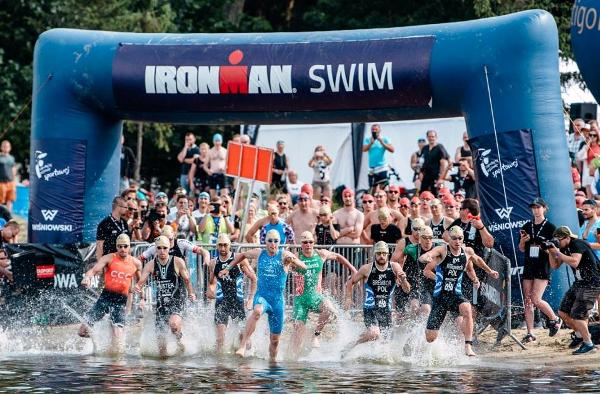A Covid-19 vaccine is on the horizon and hope springs eternal for a mostly normal 2021 triathlon season in the hearts of every triathlete who suffered through the frustration of the interrupted or abbreviated 2020 season (in other words, every triathlete!). All of that pent-up tri-energy may be pushing you to think about registering for an Iron-distance race. Having completed two Ironman races myself, I know well the mysterious stirrings that the idea of becoming an Ironman can provoke in you. The inspiration, pride, and excitement are an intoxicating elixir that so many triathletes want to drink. Watching the Youtube videos of past Ironman races is like Odysseus being tied to his ship’s mast so he can experience the sweet, irresistible, yet ultimately destructive, allure of the Siren’s song.
To help you decide whether an Ironman is in your future, I will devote my next two articles to exploring the benefits and costs of training for and trying to complete those mythical 140.6 miles of swim, bike, and run. Today’s article will focus on how Ironman will consume your life.
 Doing an Ironman is not a part-time endeavor. The race will be, for the 6-9 months that you train for it, the guiding force in your life. You will spend many hours each week training for Ironman. You will spend even more hours each week thinking, dreaming, talking, reading, and surfing the Internet about Ironman. Ironman will become your life!
Doing an Ironman is not a part-time endeavor. The race will be, for the 6-9 months that you train for it, the guiding force in your life. You will spend many hours each week training for Ironman. You will spend even more hours each week thinking, dreaming, talking, reading, and surfing the Internet about Ironman. Ironman will become your life!
Your life will revolve around training (up to 20 hours a week), sleeping (going to bed by 9 pm and getting up before dairy farmers and West Coast stock brokers), food (you can and want to eat everything in sight), and drink (I had seven forms of liquid in my fridge). Your social life will involve 5 am master’s swims, Saturday rides, and Sunday runs. If you are married, have children, or have friends who are not triathletes, Heaven help them!
Your conversations will revolve around your past triathlon experiences, your training program, your race goals, your excitement about finishing, your fears about not finishing, gathering training and race tips from experienced Ironman finishers and tri-websites, and figuring out which of the always-conflicting tips you should accept.
You will be obsessed with equipment including tri-bikes, tri-shoes, tri-helmets, and tri-suits. You will ask essential life questions, such as “Will an aero seatpost make me faster?,” “how deep should my wheels be?,” and “Which energy bars should I eat?” You will join Strava, Training Peaks, and other training websites. You will join a tri-club, sign up for online coaching, or even hire a tri-coach.
You will lose yourself in technology. If you don’t already own one, you’ll buy a power meter (e.g., Quarq), a smart training watch (e.g., Coros Apex), a bike head set (e.g., Garmin 830), and an HR chest strap (e.g., Garmin HRM-Tri). With this technology, you will become a data junkie, measuring and pouring over your daily wattage, heart rate, stride length, miles per hour, minutes per mile, minutes per 100y, SWOLF, and many other truly esoteric performance parameters related to your swim, bike, and run. You will track your progress as if your life depended on it.
 You will live for your daily workouts. You will have trouble falling asleep because you can’t wait to get up the next day and train. Or, you will have trouble falling asleep because you’re dreading getting up the next morning and train. You will wonder how a person can enjoy swimming 100 laps in a pool, riding a bike for over seven hours, and then you will understand how. You will revel in completing your first two-mile swim, 100-mile ride, and 20-mile run. You will add, “brick,” to your vocabulary and use it proudly. You will extrapolate your training and shorter-distance race times to your Ironman (bad idea!). You will add up your weekly volume every Sunday and gush with pride as you approach 20 hours.
You will live for your daily workouts. You will have trouble falling asleep because you can’t wait to get up the next day and train. Or, you will have trouble falling asleep because you’re dreading getting up the next morning and train. You will wonder how a person can enjoy swimming 100 laps in a pool, riding a bike for over seven hours, and then you will understand how. You will revel in completing your first two-mile swim, 100-mile ride, and 20-mile run. You will add, “brick,” to your vocabulary and use it proudly. You will extrapolate your training and shorter-distance race times to your Ironman (bad idea!). You will add up your weekly volume every Sunday and gush with pride as you approach 20 hours.
You will obsess about the minutiae of triathlon. You will watch videos on swim technique. You will read the latest research on Ironman nutrition. You will look forward to going to your local tri-store hoping there is something you forgot to buy that you absolutely must have. You will make lists of what you will need in your Ironman, what you will put in each transition and special-needs bag, and what you will have to do the day before and the day of the race.
You will develop a love/hate relationship with water bottles. You will have at least 10 water bottles at some point in a never-ending cycle of Ironman life; on your bike, in the sink soaking with soapy water, in the dish rack drying, or taking up an entire counter in your kitchen poised, seemingly eagerly, to return to poolside, your bike, or running waist pack.
You will arrive late to work, take long lunch breaks, and leave early. You will fall asleep at your desk. You will pray that you have a forgiving boss or be thankful you are your own boss or are unemployed. You will not get fired. You will test the strength of your relationships. Your significant others will either support you or break up with you. You will lose touch with friends.
Your body will look and feel better; leaner, more muscular. You will walk differently: a new spring in your step, a bit of swagger in your gait. You will feel differently—energized, yet tired, relaxed, yet jazzed. You will think differently: more confident, determined, and focused. After never having experienced the runner’s high, you will get the “tri-high” regularly. You will begin to think training is better than sex.
You will experience more emotional highs and lows in one day than you usually feel in a week. You will feel excitement, frustration, hope, anger, despair, doubt, awe, sadness, and inspiration..and that’s just on your bike even before you’ve begun the run segment of your brick. You will constantly ask why you are doing an Ironman—and you will come up with different answers every time. You will dream of qualifying for Kona, even if the only chance you have is to win the lottery. You will smile with joy at the thought of being an Ironman and cringe in fear at the thought of not finishing.
During the race, you will be excited at the start of the swim surrounding by so many others who face the same physical and mental challenge that lies ahead. The swim will pass quickly and you’ll realize that the race really starts as you leave T1 on your bike.
You’ll chat it up with other triathletes during the first lap of the bike (if it’s two laps) and not say a word them during the second lap because the realization of what lies ahead has hit you. At around 60-90 miles of the bike, you will have an emotional crisis when you realize that you have been out there for many hours, yet have many more to go. You will experience doubt, worry, fear, and despair. Hopefully, you’ll realize that the emotional crisis is partly a nutritional crisis and you will remind yourself that you better eat and drink a lot or your race will be over. When you pass 100 miles on the bike, you’ll see a light at the end of the tunnel (even if the end of the tunnel is just the end of the bike segment). If you fueled well, your energy will return and you’ll feel more hopeful as you enter T2.
Then reality will hit you once again like a ton of bricks! What is that reality? After a 2.4-mile swim and a 112-mile bike, you still have to run a marathon to reach that Mt. Everest-esque 140.6 miles peak. How will I do it?, you will ask. You will begin the long and lonely slog (even though you’re surrounded by many hundreds of other so-close-to-being-an-Ironman competitors thinking and feeling pretty much the same thing). But the miles will pass, slowly, to be sure, but pass they will. You may walk a lot (I did my second Ironman). You commiserate with and support others. And then you will see the light at the end of the last tunnel (and it’s not an approaching train!). The miles will tick down and, perhaps after passing the 20-mile mark, you’ll actually begin to believe you will finish within the 17-hour limit. You will begin to feel more positive than negative emotions. The pain in your body will mysteriously ease. You may begin to smile and joke about the race with those around you. Then you will see the finish and a smile as wide as the Grand Canyon will spread across your face.
You will cross the finish line and experience a veritable maelstrom of emotions. You may laugh uncontrollably or cry inconsolably and without shame. You will feel this huge weight lifted off your shoulders and a overwhelming sense of relief. You will swear that you will never do another Ironman again (and, a few weeks later, register for another). You will say “congrats!” to everyone around you as you share in both the misery of the last 10-17 hours (more likely on the latter end of the time spectrum) and the triumph of the ordeal being over. If you have family or friends who were there to support you, you will hug and thank them.
After the race, you will feel like you are about to explode with pride. You will also take pride in the Ironman walk: stiff legged, painful, so well deserved. You won’t want to take off your finisher’s medal. You will look forward to wearing all of that over-priced, yet so worth it, Ironman clothing that you bought. You will savor that first workout when you wear the hat or shirt that announces to the world that you are an Ironman. You will feel special, like having joined an exclusive club. You can now say, “I am an Ironman.”
Well, that is the way it was for me. You may experience your Ironman differently.
Do you want to take the next step in training your mind to perform your best in training and on race day? Here are four options for you:
- Read my latest mental training book: Train Your Mind for Athletic Success: Mental Preparation to Achieve Your Triathlons Goals.
- Listen to my Train Your Mind for Athletic Success podcast.
- Take a look at my online mental training courses.
- Schedule a 1:1 session with me.







